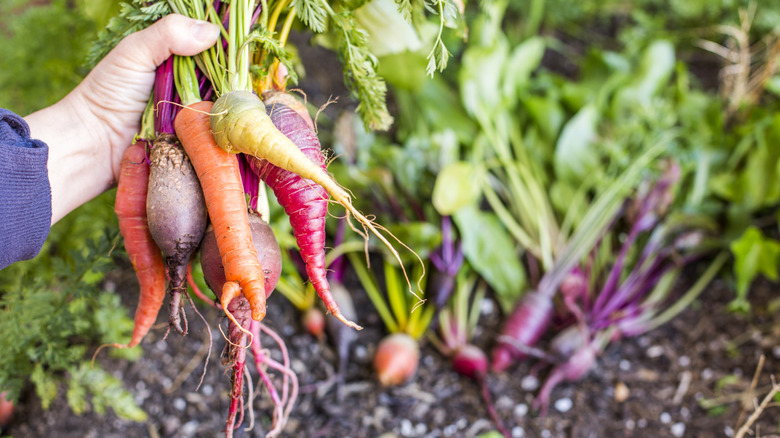The Healthiest Vegetable You Can Eat To Lower Blood Pressure And Prevent Colon Cancer At The Same Time
Keeping your blood pressure low could be as close as the veggies in your fridge. And guess what? There's one veggie that doesn't just help your cardiovascular system. On the contrary, it may also decrease your risk of colon cancer, which is a cancer that's on the rise among sedentary young people.
It's — the carrot. Whether you eat them sliced, diced, or whole, carrots contain substantial levels of numerous beneficial nutrients. For every 100 grams of raw carrot, you can expect to find 2.8 grams of fiber, 320 milligrams of potassium, and impressive amounts of vitamin A. Together, those supportive nutrients (along with a few others) provide multiple health benefits. To find out more about carrots' effects on blood pressure and colon cancer, Health Digest asked Registered Dietitian Angel Luk for her insights.
Carrots protect against high blood pressure and colon cancer
In one 2023 review that was published in the European Journal of Nutrition, consuming carrots appeared to lower blood pressure in human subjects across multiple studies. The same cardioprotective effect was observed in a 2021 study on animals from Nutrients. In that study, mice who were given carrots exhibited observable dips in all blood pressure readings after 14 weeks. And that might be appealing if you want to lower your blood pressure without drugs.
Clinical studies also support the premise that carrots may be a key food in the prevention of certain cancers. For example, a 2020 study from Nutrients looked at the colorectal preventative potential of carrots in a human subject cohort of more than 57,000 individuals. The findings suggested that adults who ate between two and four carrots weekly reduced their relative colorectal cancer risk by 17% when compared to adults who didn't eat carrots. Another 2022 study in Frontiers in Nutrition also concluded that regularly eating carrots could lower an individual's chances of developing colorectal cancer. Interestingly, the study's results suggested that eating moderate amounts of carrots was enough to make a positive impact on your health. Higher consumption of carrots didn't produce a greater anti-cancer effect.
However, Luk cautions against thinking that carrots alone are the answer to keeping cancer at bay. According to the American Institute for Cancer Research, the carotenoids, phenolic acids, and polyacetylenes in carrots are what make them helpful in fighting colon cancer. "Based on current research, it's not really 'just carrots' that are reducing the risk of cancer and improving blood pressure, but rather a diet consistently rich in non-starchy vegetables and fruit," she said. "This means that carrots are part of the symphony of nutrients that synergistically work together as a group of whole foods, rather than a solo performing artist."
Seeing carrots in a colorful new light
Of course, maybe you've grown tired of preparing carrots the same way. Or you're sick of always munching on baby carrots. It happens and even has a name: food boredom. In that case, Luk offers some clever techniques to help you rediscover how you can bring more carrots into your meals and snacks.
"Pretend they're potatoes and scrub the outside skin really well," said Luk. "Then, grate them with the skin on, then toss the grated carrots into soups, stews, chili, muffins, and omelets. This will provide extra fiber and retain the maximum amount of additional nutrients including vitamin A, C, and potassium since none of its flesh is removed."
You may want to experiment with different colors of carrots, too. As an article from the Cleveland Clinic explains, the hue of a carrot indicates that it's especially rich in specific vitamins and compounds. For instance, red carrots may have detoxifying capabilities due to the presence of molybdenum, and purple carrots — which can be used to make an unusual cardio-friendly, anti-cancer juice — could reduce inflammation since they're high in a type of antioxidant called anthocyanins. Antioxidants have been linked to a reduction in some cancers, according to a fact sheet from the National Cancer Institute. This means you may be able to more effectively reach your health goals by selectively choosing carrots based on their visual characteristics and not just their versatility or flavor.



